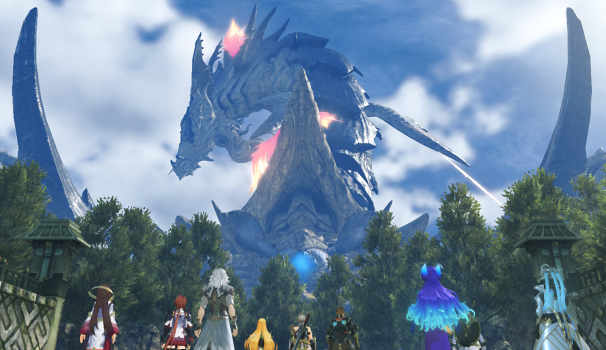
Written by Jared T. Hooper on 30 Sep 2021
Distributor Nintendo • Price £59.99
Human history is an ever-marching timeline, where the events of today dictate tomorrow's headlines, just as the fruits of today can be traced back to yesterday's roots. Rex may be the star player and orchardist of Xenoblade Chronicles 2, but he's actually picking up a torch left behind by the actors of a bygone era. 500 years before there was Rex's grand adventure to discover paradise and bring humanity with, there was the Aegis War, which nearly tore the world asunder, and the grounds for its decisive battle—the golden country of Torna.
Since Rex obviously hadn't been born yet, the story of Torna – The Golden Country follows a lady who was around back then, Lora, and her companion Jin, two characters in XC2 who are, respectively, dead and trying to end the world, but in Silver Country are two sweethearts just trying to get by. Being a side story to XC2, it bases its engine and design off of its parent title, so while you can play one and then pick up the other, it goes out of its way to make modifications to liven things up, including a number of improvements I didn't think I wanted. Drop items now float on the surface of water, and collectibles spew out of the ground in a satisfying geyser rather than like an air bubble-choked hose. In a game filled with little things that chafed me, it's almost surprising these were little things that didn't bother me, but I welcomed their renovations nonetheless.
On the topic of improvements, tutorials. XC2 was somewhat notorious for having god-awful tutorials which basically amounted to a disembodied voice explaining the various steps of calculus exactly once and then expecting you to solve every algorithm from there out, but Bronze Country is clearer in its language and provides ample arenas for practicing new mechanics, as well as offers the option of rereading past lessons. Can't make an official grade on the tutorials' effectiveness, since I'm a part-time Xenoblade champ, but I'm guessing new players won't make it ¾ through the main story before admitting that they have no idea what they're doing. Though the game does take the piss by having this giant, vibrant icon on the pause menu essentially labeled How to Play the Game, You Bloody Lout, as though it's the player's fault for not understanding the poorly explained base title.
Not all changes made are positive, however. When I say Copper Country streamlines things so that your time spent in menus is reduced by 83%, you're liable to throw your hands up in celebration, but your hands won't be up for long once you see that the game severed its own arms. Party optimization and combat required a government-funded manual to understand, but once that info was seared into your gray matter, you could customize your party to suit your every need, which is a joy Iron Country's lacking. There's far less micromanaging, but you're fit inside a box and left on top of a hill. This is in line with how most games in existence make you roll down the hill, but when XC2 gives you a boatload of supplies you can engineer a helicopter from, it's disquieting being forced to bounce down the slope in a cardboard cubicle.
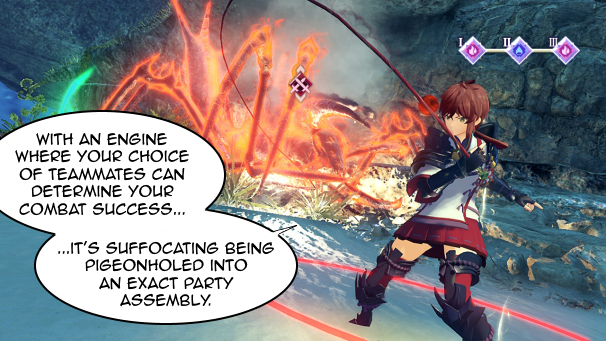
But adapt to the bumps and bruises I tried, and what my success rate was I couldn't say. Without any reserve teammates to call in, I was at the mercy of the blokes I was assigned, and I often felt like a diligent student whose partners would stomp over the volcano for our group project while pretending to be kaiju. The signature method for getting big digits damage is combining physical and magical attacks, but my teammates would frequently pulverize a baddie into subatomic particles before I had the chance to get off the spell I was prepping. I did have my fun with the combat, but it never peaked like it did in XC2. I thought this might've been because I was fatigued after dedicating a fraction of my total life force to the parent title, but when capturing screenshots for my XC2 review, I got distracted wailing on a cyborg dinosaur for an hour because it was just too fun. More likely, the lacking thrill had to do with my philosophy when stepping into this game, but I'll swing back to that for my closing thoughts.
When a massive dragon has a moniker like The Golden Country, you'd think it'd be a jewel to get to crawl over, but its biomes most of the time were unimpressive and sometimes plain confusing. During the latter half of the game, you wind through a mountain pass and arrive at a desert stretching across the dragon's hips. Skipping the geology lesson on why this makes no sense, I'll summarize a different issue I take with this area in two words: patchwork worldbuilding. Seeing a desert flanked by lush, verdant meadows in a Xenoblade game is like seeing a makeup artist substitute makeup with modeling clay. The series is so much better than that, and so much more imaginative, too. The original Xenoblade Chronicles made one mountainous region a tundra because it sat in perpetual shadow. I'm skeptical of this ecosystem's validity, but it makes sense with some hand-waving, whereas I'm baffled at the mindset that assumes a hot, arid landscape with little to no precipitation would transform into a lush grassland in the span of two centimeters.
This desert, I will admit, blew my mind because of a bluff it has overlooking a path you take in the game's first hour. It's that same crazy Dark Souls-esque level design where you fight hordes and hordes of zombies through three different postal codes, take an elevator down, and find yourself back at the starting area.
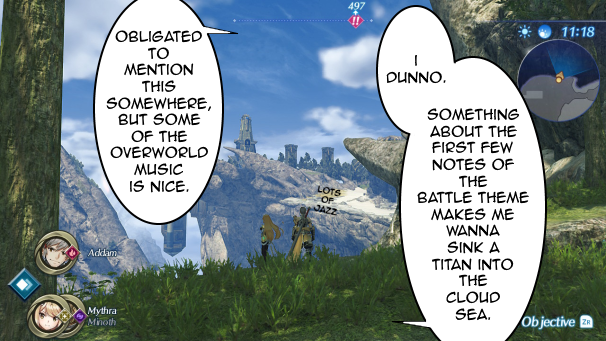
Coal Country dropped the ball for level design, and the story didn't regale me, either. The general gist is shared in XC2, so the prequel is expanding on that narrative, but not much of that expansion is worth a memory. For instance, there's a subplot where an abusive fatherish figure from Lora's childhood tries getting his revenge on her when her pal Jin got choppy-choppy with his arm, but his inclusion seems like a lazy bid to give the pacing a kick in the chestnuts. It doesn't even bother raising its foot when it sets up this tragedy of an entire village burning to the ground, because it just decides no-names did it.
I get that Steel Country doesn't want to stray too far from the lane XC2 paved, but it doesn't make much effort to pull off some sick drifts. The narrative doesn't throw in any real obstacles or twists to overcome or work around, and where the cast of XC2 would stop and ponder philosophy and shed new perspectives on an antagonist, Lead Country's cast is single-minded on getting to the big bad. Their tale is supposed to be one of once-close comrades who, come XC2, have drifted apart, even become enemies, but I didn't pick up a deeply rooted camaraderie between Lora and her allies, and their journey together was fairly underwhelming because they only travel from one end of the dragon to the other. It wasn't until I got to the end of the game and dove into the cacophony of sidequests that the party interacted on a greater basis, sewing those bonds the main game alleges.
Yes, sidequests return in this spin-off, and if you read my XC2 review, you'll know that sidequests gave me the same stimulation that rubbing my head against a wall would. You talk to a random person, they demand something of you, you go and fetch that thing or do that thing, then you come back and report the thing fetched or done. It's tedious, it's mindless, and I only bothered with them because I'm a part-time completionist, not that that matters, because Potash Country gates you from the final boss until you complete a minimum number of sidequests, which sounds like a hell specially constructed for me, but it was around this part of the game where the craziest thing happened—I began to like sidequests.
You might suspect that after grinding through enough of them, I developed Stockholm Syndrome, but the truth is that, like a person on a journey of self-improvement, sidequests made themselves worthwhile by telling the inter- and intrapersonal stories of NPCs. Your actions in one sidequest affected the livelihood of another NPC. Lora and Co have dialogue unique to each quest so that they're not insensitively commenting on a soldier's brother's death with the stock phrase, “Wow, that sucks.” I was blown away by how invested I had become in the townsfolk of the Tornan capital. I even anxiously kept checking in on one mother and her sickly daughter to see if a sidequest popped up so that I could help save her. The edits to the structures of sidequests are minor, but the effect is profound on how engaging they become, even giving you the feeling that you're a small part in a much larger close-knit community.
Community is an actual game mechanic. Whenever you help somebody out, this menu pops up to let you know they're the latest addition to your friends list. It also pops up the first time you ever speak to them, grinding the game to a halt to add them to your list. Thankfully, you have the option of turning that first pop-up off, which should've been the default, but if you ask me, this very mechanic is unnecessary. Often, a narrative is at its best, and creates the best mind-blows, when the audience is left to figure out or interpret things, and the game painting this secondary menu is too on-the-nose for what it's going for. Some NPC interactions are too on-the-nose as well. You can play the expansion before or after the parent title, but if you play it after, watching Tornans prep bomb shelters and spout optimism over their ensured survival is like watching a documentary on a little Pompeian boy expound on his dream of feeding the world's hungry the day before Vesuvius blows.
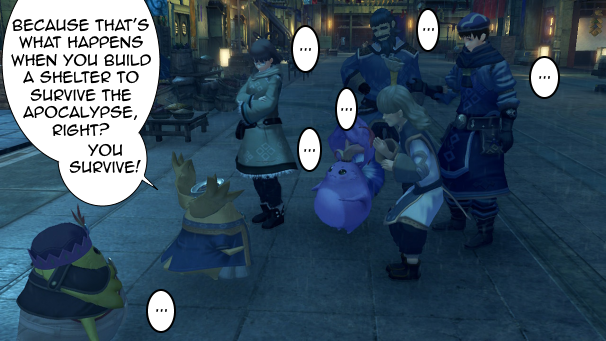
In my XC2 review, I brought up how looking up YouTube tutorials was the difference between thinking it was an okay game and really feeling it, so I decided I'd try and understand Lithium Country organically, by minimizing my scrutinizing of its Wikia and figuring mechanics out with my very own brain cells. Put another way, I was an “average player”: someone who took what the game gave them and rolled with it. No time set aside for grinding and no dedication for being the best there ever was.
My final grade for my experience as an average player is that it was average. Combat I've mentioned, but the effects took root in other areas as well, such as the new crafting system. In XC2, you can buy cakes, paintings, and other goodies to provide temporary stat buffs, but in Nickle Country, you have to craft those same goodies, which in other terms means you a.) need several different currencies that are b.) obtained in limited stock, and c.) are available in certain locations only. We all know the classic gamer joke: “It's the final boss, I've got 99 health potions, but I'm too stingy to use even one.” That's how I was with my crafting currencies. I didn't skimp on accumulating my wealth, but I was apprehensive to use up what I had on expendable items with strict time limits. Because of that, I skipped out on an entire mechanic, whose effects reverberated into other areas, namely the combat.
Games like XC2 and Feldspar Country, I've come to realize in my experimentation, are not games for the average player. That much seems obvious, since the latter can take about two dozen hours to complete and the former can take two dozen dozen hours to complete, but titles like Fire Emblem: Three Hours command similar playtimes, and I didn't find the need to devote extracurricular study time to mastering its mechanics the way I needed to for the Xenoblade titles. Their mechanics are what you'd easily find in any other game, yet they're designed so that the player needs to meet a minimum level of dedication in order to enjoy them, which can work for or against them. I wound up loving and growing fond to XC2 because I put in so much extra effort, but I'm apathetic toward Cobalt Country because I forewent that effort, and, what's more, never felt the spark to put it in.
Everything I loved about Xenoblade Chronicles 2 I didn't like in Sulfur Country, and everything I couldn't stand in Xenoblade Chronicles 2 I enjoyed in Zinc Country. As spoken in the previous paragraph's last line, it didn't hook me the way its parent story did, so I saw no point in sprinting the extra kilometer for it. I wouldn't go so far as to say it's a bad or mediocre game, but it lacks the staying power of its parent story. Nearly a year out after completing Xenoblade Chronicles 2, I still think back on its narrative, its characters, its world, the jokes the cast would crack, and occasionally get the itch to thrash the superbosses. It required an experienced friend to explain its ropes, but it carved its initials into my soul and was the second game I played since my childhood that I didn't get tired of after 60+ hours and had to force myself to see through to the credits. I picked up Uranium Country right after finishing XC2 but didn't bother finishing it until one random summer day because the game didn't stick with me. I still recall the original Xenoblade Chronicles's many plot twists, and reminiscing on the sequel's ending occasionally gets me right in my feels, but when I think back on my experience with Tungsten Country, there's hardly anything there. I enjoyed the community building before the final battle, but aside from those tiny interactions, Golden Country for me is a forgettable game.
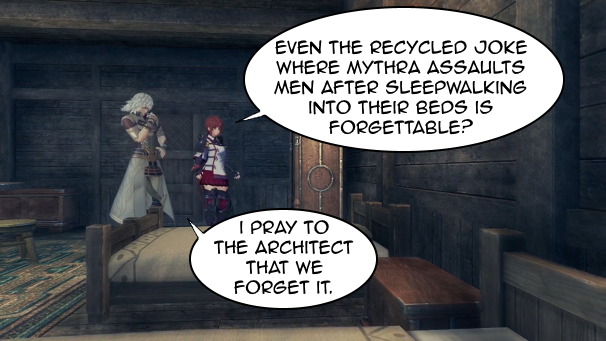
-----
Still in love with the base game but finding increasing your Blades' Trust too tedious? Well then, here's an oddly specific guide for grinding a DLC item to make increasing their Trust slightly less tedious.

Just writing about the video games that tickle my fancy when the fancy strikes.
posted by Jared T. Hooper on 17 Feb 2026
posted by Ross Locksley on 11 Feb 2026
posted by Jared T. Hooper on 06 Feb 2026
posted by Eoghan O'Connell on 04 Feb 2026
posted by Ross Locksley on 03 Feb 2026
posted by Jared T. Hooper on 21 Jan 2026
posted by Ross Locksley on 16 Dec 2025
posted by Ross Locksley on 10 Dec 2025